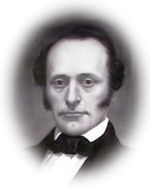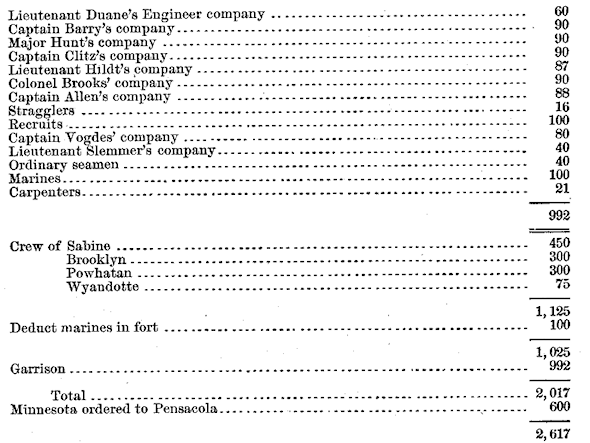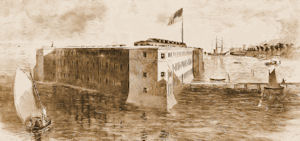HEADQUARTERS DEPARTMENT OF FLORIDA,
Fort Pickens, May 2, 1861.
Lieut. Col. TOWNSEND. Assistant Adjutant-General:
COLONEL: I have heretofore addressed my official communications to Colonel Keyes, because he, as the agent of the President as well as military secretary of the General-in-Chief, superintended the fitting out of the expedition for the relief of the fort, which expedition was then a secret one. The reasons for secrecy no longer existing, I address my letter, according to regulations, to you. Since my last letter to Colonel Keyes nothing of special interest has occurred. We have been unceasingly employed with my whole force and part of the ship’s in preparing the fort for defense and in unloading the Illinois. Some idea of the condition of the fort for defense may be had when it is considered that every day (one Sunday excepted) since the 17th of April, the day of my arrival, I have had from 1,000 to 1,200 men constantly at work, and of these, 800 have been employed on the work; and although we have achieved quite as much as I expected, we want a fortnight more of work before we shall be fully prepared to resist the numerous batteries and heavy guns that are bearing all around on us. The enemy are equally busy, having large numbers at work on several batteries which are visible to us, and judging by the number of men we see around one or two other places, I think that they have at least two other batteries we cannot see. All the guns excepting those of the forts seem of large caliber, 8 or 10 inch columbiads.
We can see one battery (No. 1) at the navy-yard; one (No. 2) in the rear of Warrington church–a large work, looking like an instruction camp; No. 3, near the barracks–no guns can be seen in it; a little southwest of the fort, and near the old light-house, a battery (No. 4) of four guns, very much concealed; and south of the new light-house another (No. 5) of four guns, plainly to be seen. There is probably one more between this and Fort McRee. These batteries and the forts enfilade and take in reverse every face and curtain of this work but one.
Fort McRee takes in reverse one more important battery, which is exposed front, flank, and rear to heavy and numerous guns (Plan D).(not found) I have no apprehensions whatever of an attack by escalade, as I think can whip them in open field; and in a very few days, by the able assistance of Major Tower, I shall be so protected from bombardment as, I hope, to be able to hold the fort a long time.
A man presented himself a few nights since to one of my sentinels, pretending to be a Northern man and a reporter of a newspaper. He brought us valuable information, and thinking his safety might be jeopardized if he returned, I sent him on board the Powhatan. Captain Porter suspected him, and there is but little doubt of his being a Southerner and a spy, as the inclosed letter, marked A, will show. He tore the original up, and scattered the fragments in a spit-box. Captain Porter had them collected and pasted together. Two days afterwards a constable or sheriff came over, under a flag, with a warrant against him for theft. I dismissed him without any name.
My command continues comparatively healthy, although the men are worked hard. In the hurry and confusion of our sudden departure from New York, articles of the first importance, which had been prepared and ready to go on board ship, were left behind, and others of little importance shipped; among the former, some 8 or 10 inch shells, which, as reported to me, were in a lighter alongside the Atlantic, and yet not taken on board. A special request to have them put on board the Illinois was also neglected, and not one of the former came. I have by borrowing of the Navy obtained enough of the latter for immediate service, and one hundred of the former, so that I have now 150–not enough for one day’s continuous firing. There are a great many guns in the fort, most of them from want of shell useless. There are twelve 32 or 42 pounder rifled guns. With a full supply of elongated balls [they] would be of inestimable value, and I earnestly hope that some of this kind are, in compliance with my former requisition, now on the way here, as also four sea-coast 10-inch mortars, and the 8 and 10 inch shells which were left behind. The 10-inch siege mortars will barely reach the navy-yard, and will not be so efficient as they should be, though I hope with the maximum charges to render them effective. I have a battery of two mortars in the ditch, and am now building another about half mile from the first, where I also propose to erect a battery of heavy guns, if the enemy gives us time and I can get them.
I am no further enlightened than when I last wrote on the cause of delay in their opening fire on us. Every day makes me feel more secure of making an efficient defense, and in a very few days my defensive preparations will be complete. I learn from several sources that the Montgomery and Pensacola Railroad is not finished by eight miles, and that they have two bridges yet to build.
Having received unofficial information that the President has issued a proclamation blockading the ports of the seceding States, I requested a conference with Captain Adams, commanding the naval forces, and asked him if he would not feel himself authorized to anticipate its official reception. Having also heard that a vessel loaded with an Armstrong gun and ammunition is on her way here from Charleston, I asked the captain if he would examine vessels entering the port, and stop such as have articles contraband of war. He said that his orders were to act strictly on the defensive; that a sufficient time has elapsed since the date of the proclamation for him to have received official notice of it if it were published, and as he has received no such notice he did not feel at liberty in any manner to alter the existing status. The next day I renewed the subject in a letter, a copy of which I send you (B) with his answer (C), in which he accedes to my wishes that vessels having articles contraband of war on board shall be stopped, and Captain Porter, with the Powhatan and a small schooner I let him have, is now boarding all vessels entering the harbor.
Major Arnold reports all well at Fort Jefferson; that he is busily engaged in strengthening his post, and that he considers himself capable of repelling any force that can be brought by the rebels against him.
At Key West the secession feeling fomented by the Confederate Secretary of the Navy still prevails among some influential citizens. Major French’s policy has been, I fear, too tampering, and he has not taken sufficiently active measures in strengthening the Union party and fostering the Union feeling. I have therefore given him peremptory orders (letter D)on the subject. I do not consider Key West to be sufficiently garrisoned, and have therefore ordered Major French, in case of the arrival of troops there on their way north, to detain two full companies (letter E). Should no troops be expected to touch there, I respectfully recommend that two companies of regulars or four of volunteers be immediately sent to that place. A small steamer or steam-tug–one that is fast and of light draught of water–would render us very great service. I have chartered a small schooner, but have had to let the Navy have her for overhauling vessels attempting to enter the harbor, and besides a sail vessel is not suitable for our purposes.
I am, colonel, very respectfully, your obedient servant,
HARVEY BROWN,
Major, Second Artillery, Colonel Commanding.
![]()
[Inclosure A. ]
U. S. STEAM-SLOOP POWHATAN, April 28, 1861.
Col. HARVEY BROWN, Commanding Fort Pickens, Fla.:
DEAR SIR: The inclosed letter will give you a pretty good idea of our “spy.” He tore it up and threw the pieces into a spit-box. I had them collected and put together. All his movements are watched.
He wrote another yesterday, which I shall get hold of before long. Please save the inclosed for me. I shall probably be pulling about the channel and harbor to-night or to-morrow night. Will you direct your guard-boat to keep clear of me? I shall be in a black double-banked boat, and the enemy have none such. If the guard-boat gets close to us, the watchword is “Bragg.”
A little pilot-boat schooner chartered by the Army arrived here yesterday. She would be a great acquisition to us for certain purposes, while here doing nothing. I am to act as guard-ship hereafter, and prevent the inside people from receiving munitions of war. The schooner would be a great assistance in enabling me to cut off fast sailing vessels. If you have the authority, do you not think that it would be well to keep her here? I will mount a rifle gun on her. Captain Adams has appointed the Wyandotte to assist me, but she draws fifteen feet of water, and could not chase those fellows over the shoal spots, and her machinery is defective. I could do more with the schooner, particularly with a breeze.
I am, very truly and respectfully, yours,
D. D. PORTER,
Lieutenant, Commanding.
J. C. MORRIS Esq.:
DEAR SIR: I wrote you from Atlanta. Was my note received and attended to? Please telegraph my friends that I spend a couple of days at Pensacola previous to my departure for Texas. I want to see a besieged fortress once in a life-time. Everything goes on finely here. Hope to hear of surrender of Fort Sumter to-day; next Pickens, and then Washington.
Very truly,
JOE.
![]()
[Inclosure B.]
HEADQUARTERS DEPARTMENT OF FLORIDA,
Fort Pickens, April 26, 1861.
Capt. H. A. ADAMS, Commanding Naval Forces off Pensacola:
CAPTAIN: I received yesterday the lanterns and your order, for which I am much obliged. We are sadly deficient in 8-inch shell for one sea-coast howitzer, to act against the navy-yard. I am told that you have some. If you have and can spare a part of them it will greatly relieve me. I am also told that the Brooklyn has an abundance of 9-inch shell guns, and I would submit to your consideration the expediency of establishing a naval battery near the fort of, say, three of those guns, to be manned and fought exclusively by the Navy. Their co-operation in this manner would be of the most essential importance, and the Navy associated with the Army in the defense of this fort would cause a generous emulation between the two services promotive of the best feeling. I am told that a vessel is now on her way from Charleston to this place, loaded with an Armstrong gun, ammunition, and projectiles. It is of vital importance to us that such a gun should not be used against us, and I cannot but think that with the information we now have of hostilities having actually commenced, you will be warranted in detaining her, or any other vessel having articles contraband of war, and I would suggest whether your not doing so might not be unfavorably received at home. I do not, under present existing circumstances, propose capturing the vessel, but only that entrance to this harbor should be prohibited.
I am, sir, very respectfully, your obedient servant,
HARVEY BROWN,
Colonel, Commanding.
![]()
[Inclosure C. ]
U. S. FRIGATE SABINE,
Off Pensacola, April 28, 1861.
Col. H. BROWN, Commanding Department of Florida, Fort Pickens :
SIR: I fully concur with you in the propriety of preventing munitions of war from being carried into Pensacola, and have given the necessary orders to that effect. The establishment of a naval battery on shore seems to me at this time almost impracticable. Our men are exhausted by hard work, which is still accumulating, and diminished by sickness and detachments. The remainder are necessary for the care and defense of the ships, and for landing parties to co-operate with you. Officers we have none. I am hourly looking for the arrival of Flag Officer Stringham, to whom I will refer your proposal immediately. He will have a fresh crew and officers to spare. In the mean time I would suggest that a place for the battery be selected and prepared for the guns by laying platforms, &c. They are very heavy, and will require solid foundations.
Will not the guns of the Brooklyn do quite as efficient service on board as they would on shore to prevent in the manner we discussed the other day the approach to the fort by Santa Rosa? In case of necessity she can get much nearer the beach than she now is.
Very respectfully, your obedient servant,
H. A. ADAMS,
Captain, Senior Officer Present.
![]()
[Inclosure D.]
HEADQUARTERS DEPARTMENT OF FLORIDA,
Fort Pickens, Fla., May 2, 1861.
Maj. W. H. FRENCH, Commanding Fort Taylor:
MAJOR: Your communication of 24th ultimo, regarding affairs at Key West, is received.
The colonel commanding approves your reasons for not cutting the brush and undergrowth on the island, and you will, therefore, leave it uncut. The purchase of the schooner is also approved, but the colonel thinks it might have been better to submit the matter to the proper authority in Washington. Your proposed purchase of mules is approved, and you will send them here by the first opportunity. As soon as possible, endeavor to learn certainly whether Judge Marvin intends to resign, and if he does, direct him to report the fact to Washington immediately by the Illinois, if possible. The colonel further directs that you ascertain definitely whether the State courts acknowledge allegiance to the United States. If they do, you will protect them fully in the discharge of their legitimate duties; if not, you will forbid and prevent their sessions. You will give the new Federal appointments your full support and countenance.
In no case must any other flag than our national one be permitted to fly over any public building, or any body of men doing or organized to do, anything belonging to the duties of the Federal Government. Should the necessity arise, you will be directed in your course by the letter of instructions to the colonel, and be firm and decided in executing your orders. You will go to Mr. Patterson, and having shown the authority of the colonel, will request him to furnish steamers in government employ with coal in cases of necessity. The colonel will address him personally on the subject.
Very respectfully, your obedient servant,
GEO. L. HARTSUFF
Assistant Adjutant-General.
![]()
[Inclosure E.]
HEADQUARTERS DEPARTMENT OF FLORIDA,
Fort Pickens, Fla., May 1, 1861.
Bvt. Maj. W. H. FRENCH, Commanding Fort Taylor:
MAJOR: The colonel commanding directs that if a vessel shall arrive at Key West with troops bound for a northern post, if the commander does not rank the colonel commanding this department, you direct him to land two companies, filled to the maximum organization from others which may be on board, to form a part of the garrison of the fort or barracks, as you may deem most advisable, and, if necessary, to be transferred to this post for its defense. If the officer in command should be superior in rank, you will then show him a copy of the order of the President, giving the colonel commanding authority to call on all officers of the Army and Navy for assistance, and in his name call upon him for the two companies. You will show the authority named to the officer, whether he does or does not rank the colonel commanding.
Very respectfully, your obedient servant,
GEO. L. HARTSUFF,
Assistant Adjutant-General.







